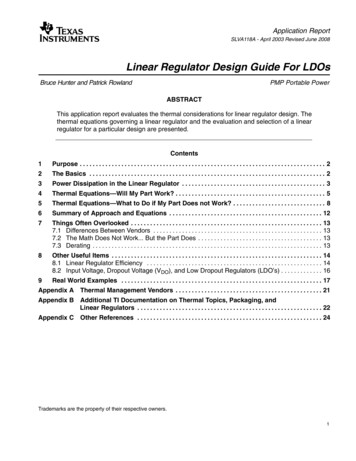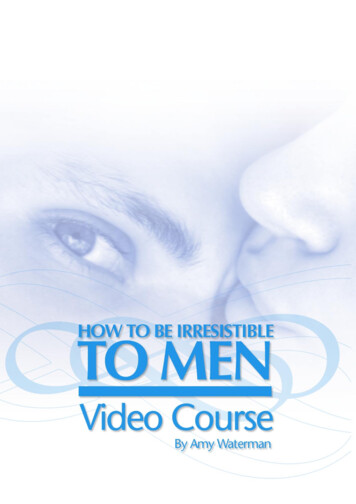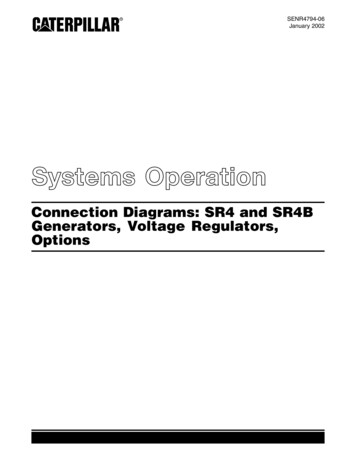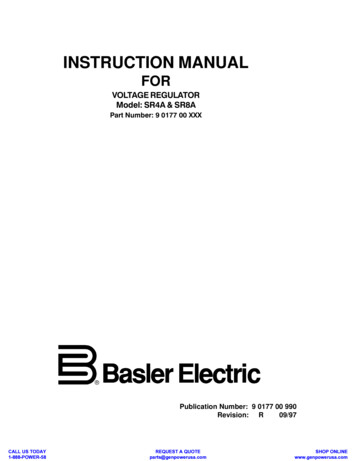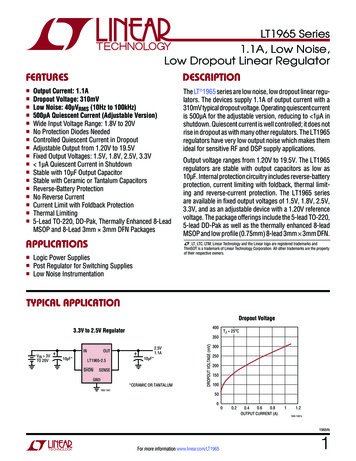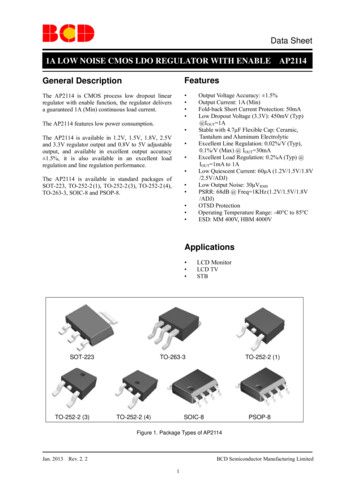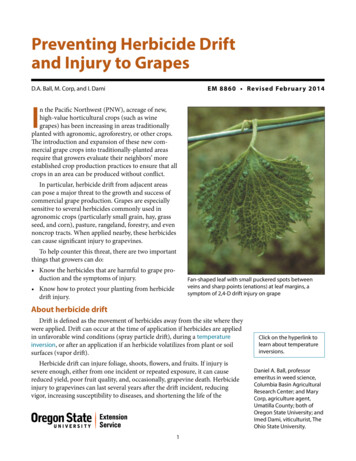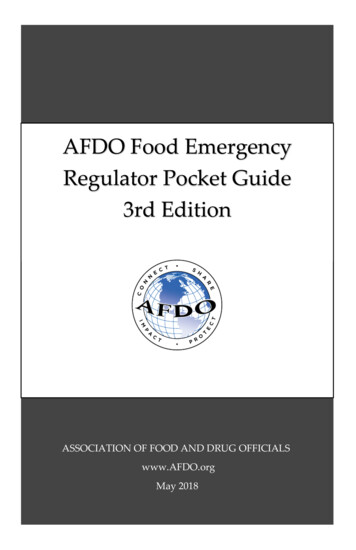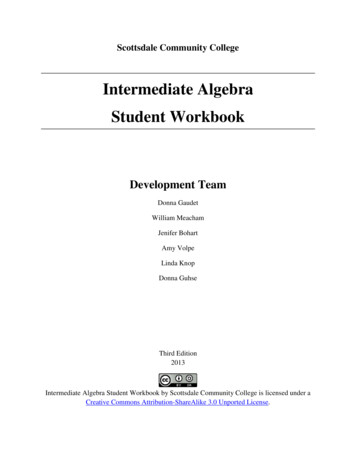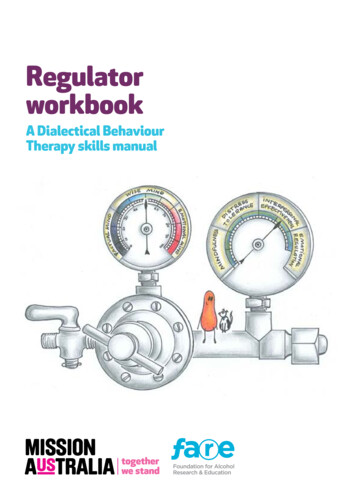
Transcription
RegulatorworkbookA Dialectical BehaviourTherapy skills manual
Regulator workbook 2
About this bookThis workbook includes a summary of strategies youwill learn about in group therapy.Skills included in this book are designed to help youregulate your reactions to distress and painful events,regulate relationships, and regulate emotions.This book is yours. You should add notes, draw, anddecorate your book in any way that will remind you ofthe discussions and exercises you participate in duringgroup therapy time.Regulator workbook 3
MindfulnessMindfulness is a skill to help us slow things down andbe in the here and now. Mindfulness can also help us tobalance facts and emotions to come up with the solutionthat best meets our needs and substance use goals.Regulator workbook 4
MindfulnessWhat to doHow to do itObserve the situationusing your 5 senses.Be sure to focus onwhat is around you, andalso what is happeningwithin you, i.e. thoughtsNon-judgementally.It is important notto judge yourselfor others.Describe the situationby putting words to theexperience. Be specificand don’t use labels.Effectively. Do whatworks and let go ofthings holding youback, e.g. worrythoughts, pride etc.Consider short andlong term goals.Participatewholeheartedly in themoment!One-mindfully.Focus on your specificobjective and do whatworks to get thatgoal met.and feelings.Regulator workbook 5
The three mind statesRegulator workbook 6
Tips to get into wise mindFirst scan to see which mind state you are in. If you are in emotion mind, check out the facts – askyourself who, what, when, where? Use your 5 senses toground yourself in the present moment. If you are in factual mind, get in touch with how youfeel - scan your body for emotions, ask yourself how afriend would feel in the situation.Regulator workbook 7
NotesRegulator workbook 8
Distress toleranceDistress tolerance skills are healthy ways to survive themoment of distress, or crisis, without making it worse.These skills will not solve the problem and should onlybe used in the short term to help get us through, andback into wise mind.Regulator workbook 9
Distress toleranceWhen to use distress tolerance skills When distress is intense but it is an inappropriatetime to solve the problem (e.g. at work, in socialsettings, etc) When the problem can’t be immediately solved (if youhave the solution and it is an appropriate time, then do it!) When the problem can be solved and you have theskills, but you can’t use them as you are overwhelmed,tired, etc When you are experiencing intense urges to behave ina way that your wise mind would not recommendTIP: Remember thatoveruse of these skillscan lead to avoidanceRegulator workbook 10
NotesRegulator workbook 11
Distract using hing awayThoughtsSensationsRegulator workbook 12
My distraction strategiesRegulator workbook 13
Self-sootheComfort and be kind to yourself. Engage your 5 senses –smell, taste, see, hear and touch.Self-soothing works by reducing the physiologicalarousal associated with distress.When you are in a more relaxed state, your body feelsbetter and responds in a healthier way than when youare stressed.Regulator workbook 14
Self-soothe strategiesSeeHearTasteSmellTouchTop tipCreate your own virtual self soothe kit by signing up to Pinterest and saving pictures,videos and music to a secret Pinboard. When you are feeling distressed, simply sign inand view the things that comfort you. You could also do this with a real self soothe boxin your room; place photos, perfumes, CD’s, lollies, stress balls or whatever works foryou, into a box and have it close by for when you feel distressed.Regulator workbook 15
IMPROVE the momentImageryMeaningPrayer or meditationRelaxationOne thing in the momentVacationEncouragementRegulator workbook 16
NotesRegulator workbook 17
Pros and consWhen we are distressed we often act on impulsiveurges that will make us feel better in the short-term.To encourage deliberate reflection on short and longterm outcomes, use a 4 column pros and cons list toidentify the positives and negatives of acting on theurge. Remember to use your mindfulness skills toobjectively describe the situation, the urge and thepotential outcomes.Regulator workbook 18
Pros and consThe crisisThe urgePros of acting on the urgeCons of acting on the urgePros of not acting on the urgeCons of not acting on the urgeRegulator workbook 19
Urge surfingIt is important to remember that emotions and urgesdo not last forever; they swell, crest and subside. Useyour mindfulness skills to ‘ride the wave’ withoutjudging, countering or acting on the craving.Regulator workbook 20
NotesRegulator workbook 21
Effects of substance abuseRegulator workbook 22
Willingness versus wilfulnessSuffering pain non-acceptance of reality.It is a choice to accept and be willing rather than wilful.Regulator workbook 23
Interpersonal effectivenessInterpersonal effectiveness skills are strategiesto build and maintain healthy relationships and tocommunicate our needs effectively, whilst balancing theneeds of others.Regulator workbook 24
Dialectics and the middle ground1. Move away from “either-or” thinking to “both-and”thinking. Avoid words like “always” and “never.”2. Be descriptive.3. Look for the kernel of truth in each position.4. Practice looking at other points of view and find bothsides of the story.5. Accept that different opinions can be legitimate andthat no one has the absolute truth.Regulator workbook 25
Communicating pear confidentNegotiateTop tipMake sure you also focus on your goal. Is it: (1) to get an objective/need met,(2) to maintain a healthy relationship, or (3) to maintain your self-respect?It might be all three, but prioritise what’s most important before planning howand what to communicate!Regulator workbook 26
NotesRegulator workbook 27
What else to consider whenmaking a request or saying noAbilityIs the person able to give me what I want? Do I have what theperson wants?TimingIs this a good time? Is the person in a good mood? Is this a badtime to say no?PreparationDo I have all the facts I need? Am I clear about what I want? Is theperson’s request clear? Do I know what I’m agreeing to?RightsIs the person morally or legally required to fulfil my request?Am I morally or legally required to agree?RelationshipIs what I want appropriate to the current relationship? Is whatthe person is asking for appropriate to the relationship?Give and takeWhat have I done for them recently? Am I giving as much asI’m asking for? Do I owe them a favour? Does this person do alot for me?Long vsshort-termWill not asking create some short-term peace, but cause moreproblems in future? Is giving in to short-term peace moreimportant than the long-term welfare of the relationship? Will Ieventually regret or resent saying no?RespectWill making this request compromise my self-respect? Will notasking do so? Will saying no make me feel bad about myself? Willnot saying no make me feel bad about myself?Regulator workbook 28
Keeping good relationshipsbe Gentlebe InterestedValidateuse an Easy mannerRegulator workbook 29
Tips for saying no if you’reoffered substancesThe 3 D’s: Delay, Distract, DecideFind something else to focus on so that you can delay actingon the urge. Decide whether or not it’s a good idea to use, ata later time (e.g. say to a friend, can we go and watch a movieand talk about this later?).Avoid excusesPractice assertivenessSuggest an alternative(e.g. no thank you, but do you want to go grab a coffee?)Change the subject(e.g. no thanks, but how have you been, I haven’t seen you forages?)Challenge the person/ask for a change(e.g. if we’re going to stay friends I have to ask that you don’tpressure me to use)Regulator workbook 30
NotesRegulator workbook 31
Emotion regulationEmotion regulation skills are strategies to reducevulnerability to emotion mind. They are about learningto identify and manage emotions, and looking at howemotions arise.Regulator workbook 32
Regulator workbook 33
Primary and secondary emotionsRegulator workbook 34
Regulator workbook 35
NotesRegulator workbook 36
Reducing vulnerability toemotion mindtreat Physical iLlnessEat healthilyuse an Avoid mood alteringsubstancesget adequate SleepExerciseRegulator workbook 37
Acting oppositeIdentify the action urge associated with your emotion.If it is unjustified or unhelpful, throw yourself 100%into doing the opposite action to the urge. Rememberyour physical behaviour directly impacts and influencesyour mood and thinking.Regulator workbook 38
Build positiveemotional experiencesRegularly plan to do something you enjoy.Regulator workbook 39
Build masteryRegularly plan to do something you’re good at, and planto practice something you want to get better at.Things I’m good at nowThings I want to develop mastery inRegulator workbook 40
Regulator workbook 41
Valued livingBe mindful of what’s really important to you and try tomake choices that are in line with these values.Regulator workbook 42
NotesRegulator workbook 43
NotesRegulator workbook 44
Regulator workbook 45
NotesRegulator workbook 46
NotesRegulator workbook 47
Mission Australia helpspeople regain theirindependence - bystanding together withAustralians in need,until they can stand forthemselves.Contact usFor further information please contactTriple Care Farm on:02 4860 m/MissionAust
Regulator workbook 18 Pros and cons When we are distressed we often act on impulsive urges that will make us feel better in the short-term. To encourage deliberate reflection on short and long term outcomes, use a 4 column pros and cons list to identify the positives and negatives of acting on the urge. Remember to use your mindfulness skills to

